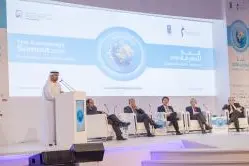PHOTO
Speaking at the session were H.E. Saeed Al Tayer, MD and CEO of DEWA; H.E. Dr. Aisha Butti bin Bishr of the Smart Dubai Office; Academic Researcher Vivek Wadhwa; and Bibop G. Gresta and Dirk Ahlborn of Hyperloop Transportation Technologies, Inc.
Dubai, December 6, 2016
A panel discussion exploring “Future Cities” and the role that knowledge plays in that regard concluded the sessions of day one of the Knowledge Summit 2016, organised by the Mohammed bin Rashid Al Maktoum Foundation (MBRF) on December 5-7, 2016, at the Grand Hyatt Dubai hotel.
Bearing the theme “Knowledge… Present and Future”, the three-day Summit is held under the patronage of H.H. Sheikh Mohammed bin Rashid Al Maktoum, Vice President and Prime Minister of the UAE and Ruler of Dubai, as well as under the directives and in the presence of H.H. Sheikh Ahmed bin Mohammed bin Rashid Al Maktoum, Chairman of MBRF. The Summit brings together prominent ministers, executives, and intellectuals to discuss ways to boost the production and dissemination of knowledge.
Speaking at the session were His Excellency Saeed Al Tayer, Managing Director and CEO of the Dubai Electricity and Water Authority (DEWA); Her Excellency Dr. Aisha Butti bin Bishr, Director-General of the Smart Dubai Office; Vivek Wadhwa, Academic Researcher, Writer, and Entrepreneur; Bibop G. Gresta, Chairman and COO of Hyperloop Transportation Technologies, Inc.; Dirk Ahlborn, CEO of Hyperloop Transportation Technologies, Inc.
H.E. Al Tayer introduced a number of the Authority’s projects for the future – revolving around green and more efficient technologies – saying: “The Authority’s efforts adhered to the vision of His Highness Sheikh Mohammed bin Rashid Al Maktoum, Vice President and Prime Minister of the UAE and Ruler of Dubai, which calls to make clean energy account for 75% of total energy in Dubai. The Mohammed bin Rashid Al Maktoum Solar Park is one of the largest solar power plants in the world; it produces 4,000 MW of power at a total cost of AED50 billion and contributes to reducing carbon emissions.”
“One of the most important elements in the development of smart cities is the cooperation between all relevant authorities to improve in all services – particularly, the interaction between the public and private sectors,” H.E. Al Tayer noted, citing as an example the Authority’s “Shams Dubai” and “Green Charger” initiatives. The latter saw DEWA install 100 green charging stations in shopping malls and petrol stations, among other busy locations.
Her Excellency Dr. Aisha Butti bin Bishr, meanwhile, said: “There is no one definition for smart cities. Each city saw a set of challenges to address and adopted a set of technologies to face them. For us, a smart city is a city that offers an easy and satisfying experience for its residents.”
“No institution can build a smart city on its own; public and private organisations must work together,” H.E. bin Bishr added, stressing the importance of compiling and sharing data to build a smart city. “In Dubai, we have reached a stage where 89% of customers report being satisfied with government services. We are now providing 55 services, all of which can be accessed from one app – DubaiNow.”
Meanwhile, Vivek Wadhwa, said: “Technology is progressing exponentially; everything tech touches goes on an exponential curve. What we carry around in our pockets today would’ve cost millions of dollars and weighed over 100 pounds just 30 or 40 years ago. The takeaway from this would be that smart cities could be built inexpensively.”
“In 2015, robots have become so sophisticated that they are replacing humans in complex manufacturing jobs,” Wadhwa continued. “This presents immense opportunities for cities like Dubai to become a manufacturing hub for the entire Middle East region, as well as parts of Asia. What is more, it is now possible for us to edit DNA; this means we could engineer plants that can grow in the desert and solve food security issues in the UAE and the region.”
Wrapping up the presentations, Hyperloop Transportation Technologies’ Dirk Ahlborn and Bibop G. Gresta underlined the advantage that hyperloop technology can offer the cities of the future enabling them to face the problems currently plaguing the transportation sector, from traffic congestion and time spent on the road to pollution and safety.
“Every rail system in the world is currently losing money,” noted Ahlborn. “Hyperloop can change that. In addition to that, Hyperloop is energy net-positive. Dubai is currently pushing to go green; this is not only socially responsible but it also makes business sense.”
Within just 34 months, Hyperloop Transportation Technologies registered 16 design patents, registered trademarks in 28 countries, forged partnerships with 32 leading companies, and signed hyperloop system agreements in California and Slovakia. What is more, the company will soon begin a feasibility study to build a hyperloop line between Abu Dhabi and Al Ain.
-Ends-
© Press Release 2016




















